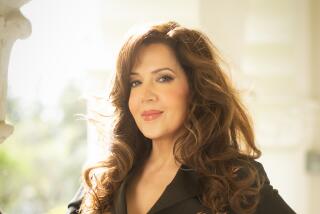
- Share via
Actress Jenna Ortega has been named Harper’s Bazaar Breakthrough Artist of the Year, and in a recent interview with the publication, she discussed her Latinx identity and what it means for her to be a representative of her culture.
The actress, who is of Mexican and Puerto Rican descent, spoke in the interview about her goal of being an inspiration for other Latinos.
“I want all people of Latin descent to be able to see themselves on screen. I want to feel that I could open doors for other people,” Ortega said.
According to a recent analysis from Pew Research, 78% of U.S. Hispanics say it is not necessary to speak Spanish in order to be considered Hispanic. Within the group of Latinos who don’t speak Spanish, however, 54% say they have been shamed because of it.
Within the last year, Ortega has seen her star rise thanks to her leading role in “Wednesday,” which has earned her Emmy and Golden Globe nominations.
All of this stardom has also placed Ortega under a social microscope.
Earlier this year an incident at a fashion show in Paris sparked conversations about whether Ortega was “Latinx enough.” In a clip of the incident posted on social media, Argentinian actress Anya Taylor Joy speaks in Spanish as she introduces her husband to Ortega and Spanish singer Rosalía, and Ortega responds in English.
People left comments on the video questioning Ortega’s Latinx identity because she was not a Spanish speaker. In recent years there has been more discussion about how cultural identity should not be measured by one’s ability to speak a language.
Most also say it’s not necessary to speak Spanish to be considered Latino, the Pew Research Center analysis found.
“I wasn’t born in a Spanish-speaking country, I haven’t spent a lot of time in Mexico and I’ve never been to Puerto Rico — so there’s a feeling of not being worthy enough to be a proper representative,” Ortega said.
A Pew Research study this year indicated that 78% of U.S. Hispanics don’t think it’s necessary to speak Spanish to be considered Hispanic. Like Ortega, about 54% said they had been shamed for not speaking Spanish.
Ortega hopes to take her talents beyond just being in front of the camera. As she continues to grow in her career she has begun exploring producing, and eventually wants to direct. She also has a love for music and composing and spends a lot of her time playing with sounds.
The concept of Latinidad in the U.S. is changing. One byproduct of recent shifts might be more room for Brazilian Americans to have a voice.
“It’s the way I connect with people on set or form bonds, or even make friends, really,” Ortega said. “I try to find the music nerds.”
More to Read
The Latinx experience chronicled
Get the Latinx Files newsletter for stories that capture the multitudes within our communities.
You may occasionally receive promotional content from the Los Angeles Times.











